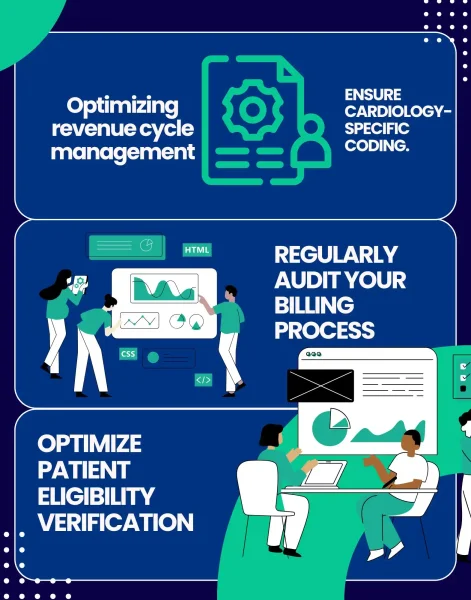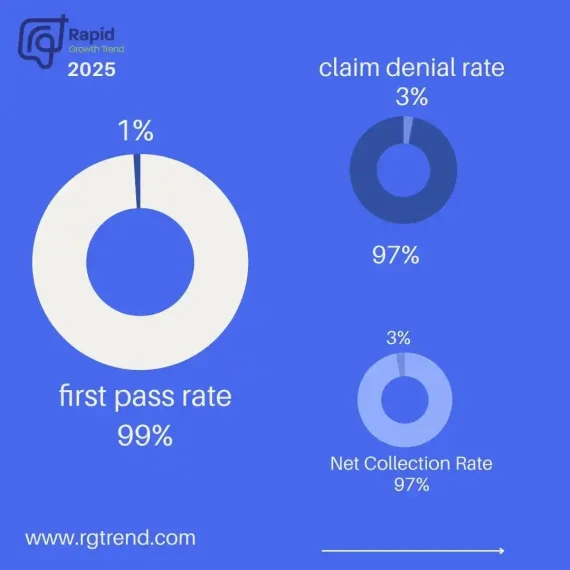Cardiology Medical Billing: The Ultimate Guide
Free Revenue Cycle Audit
Schedule your free audit today to uncover opportunities for efficiency and optimized patient care.
What is cardiology medical billing ?
Cardiology medical billing involves the process of accurately translating cardiology-related healthcare services into billable charges. Proper billing ensures that cardiologists and healthcare facilities get reimbursed by insurance providers while maintaining compliance with regulations.
Cardiology medical billing involves the process of accurately translating cardiology-related healthcare services into billable charges. Proper billing ensures that cardiologists and healthcare facilities get reimbursed by insurance providers while maintaining compliance with regulations. This process requires expertise in cardiology-specific codes, attention to detail, and a thorough understanding of insurance policies and procedures. Ensuring timely and accurate submission of claims minimizes denials and delays in reimbursement, ultimately improving cash flow and operational efficiency for healthcare providers.
Why Cardiology Medical Billing is Crucial for Healthcare Providers?
Accurate Reimbursements: Proper cardiology billing ensures that healthcare providers receive fair compensation for their services.
Regulatory Compliance: Helps avoid legal penalties by adhering to healthcare billing standards.
Revenue Optimization: Reduces errors that lead to claim denials, improving the overall revenue cycle.
Efficient Resource Allocation: Streamlined billing processes allow healthcare providers to focus on delivering quality patient care rather than administrative tasks.
Improved Cash Flow: Timely and accurate claim submissions result in faster reimbursements, ensuring consistent cash flow for the practice.
Enhanced Patient Satisfaction: Transparent billing practices and reduced claim-related disputes create a smoother experience for patients, fostering trust and loyalty.
Cardiology Medical Billing Process: Step-by-Step Guide :
Step 1: Patient Registration
Collect accurate patient details, including insurance information, to ensure seamless billing later. Missing even one detail can lead to frustrating delays and rejected claims. Studies show that practices with proper registration processes reduce billing errors by up to 20%, leading to smoother operations and happier patients
Step 2: Documentation of Services
Ensure cardiologists document all services provided, including diagnostics and procedures. Accurate documentation is the backbone of successful billing. Without detailed records, your claims are more likely to be denied. Did you know that 30% of claim denials are due to incomplete documentation? Don’t let that happen to your practice.
Step 3: Coding the Services
Use accurate CPT and ICD codes for cardiology services. Mis-coding leads to claim denials.
Step 4: Claim Submission
Submit clean claims to the payer for faster reimbursements. Every day a claim is delayed can hurt your practice’s cash flow. Research indicates that practices submitting error-free claims experience 15% faster payments. Double-check every claim before submission to avoid costly rejections.
Step 5: Payment Posting and Follow-Up
Post received payments and follow up on unpaid or denied claims. Timely follow-up can recover up to 35% of initially denied claims. Don’t let money slip through the cracks—consistent follow-up shows insurers you mean business and ensures steady revenue.
Common Challenges incardiology medical billing :
- Time-consuming prior authorizations that can delay patient care and impact revenue collection.
- Complex Procedures: Cardiology services involve intricate procedures requiring precise coding.
- Frequent Changes in Regulations: Keeping up with changing compliance requirements is essential. keep updated ; see our new blog about 2025 cardiology medical billing guidelines
- High Denial Rates: Errors in coding or documentation lead to frequent claim denials. see our case study :30 % reduction in claim denails with doctor Aziz in the first two months
Ensuring Compliance with Cardiology Billing Regulations
Compliance is everything in cardiology billing services. Ensure your practice adheres to HIPAA guidelines and stays updated on CMS regulations to avoid costly penalties. According to a 2023 healthcare compliance report, 45% of cardiology practices faced audits due to coding errors. Regular internal audits and staff training on regulatory updates can reduce risks. Referencing CMS and industry research papers ensures best practices are followed.
Best Practices:
- Tips for Streamlining Cardiology Billing Processes and Avoiding Errors
- Stay Informed on Industry Regulations
Regularly update your billing staff on the latest cardiology billing guidelines to minimize errors caused by outdated knowledge. Subscribing to industry newsletters and joining professional associations can provide timely updates and insights. - Standardize Billing Procedures
Create a comprehensive and standardized workflow for cardiology billing tasks. Clearly define each step, from patient data entry to claim submission, to minimize variations and reduce the risk of errors. - Perform Routine Internal Audits
Conduct regular audits to identify and address errors before claims are submitted. This proactive approach helps uncover discrepancies, reduces denial rates, and fosters a culture of continuous improvement among your team. - Implement Denial Management Protocols
Establish a structured process for managing denied claims. By systematically identifying, analyzing, and resolving claim denials, you can prevent recurring issues and improve overall reimbursement rates. - Outsource Complex Billing Tasks
For intricate cardiology billing requirements, consider partnering with specialized third-party billing experts. Outsourcing not only reduces the workload on your in-house team but also enhances accuracy and compliance.see how companies like us can help you in this part
How to Improve Revenue Cycle Management in Cardiology Billing
Optimizing revenue cycle management (RCM) is essential for profitability. Here are the key tips and
ensure cardiology-specific coding.
- Optimize Patient Eligibility Verification
- Streamline Denial Management Processes
Regularly audit your billing process :you can get your free audit from here .
do not miss learning in depth about revenue cycle managment (rcm)for cardiologist in our blog here

Benefits of Outsourcing Cardiology Medical Billing
Thinking about outsourcing? Smart move. Here’s why:
- Improved Accuracy: Professionals like our company and many other companies with expertise in cardiology coding handle intricate procedures, reducing errors and ensuring compliance with the latest regulations.
- Faster Payments: Specialized billing services reduce claim denial rates, leading to quicker revenue cycles and improved cash flow.
- Enhanced Compliance: Third-party experts stay updated on ever-changing billing and coding regulations, reducing the risk of non-compliance penalties.
- Scalability: As your practice grows, outsourced billing services can easily scale to meet increased demands without requiring additional internal resources.
- Dedicated Denial Management: Outsourcing partners often have robust denial management protocols.
- learn more about outsourcing and rcm in our blog here.
- this infograph shows some of our services in numbers contact us to learn more and get free counsultation.

Choosing the Right Cardiology Billing Company: Essential Tips for Success
Selecting the right billing partner is as crucial —your success hinges on it. Here’s what to consider:
Key Features to Look for in a Cardiology Billing Partner:
- Expertise in cardiology billing: Ensure the company specializes in handling complex cardiology procedures and medical codes for accuracy.
- Transparent pricing: Avoid billing companies with hidden fees—clarity ensures trust and better financial planning.
- Tailored solutions: Choose a partner that offers customized services designed to meet the unique needs of cardiology practices.
- Compliance & Security: Verify that the partner is HIPAA-compliant and follows stringent security protocols to protect sensitive patient data.
- Proven track record: Check reviews, case studies, and references to ensure the company delivers reliable results.
Frequently Asked Questions About Cardiology Medical Billing
what is outsource billing ?
Outsource billing refers to the practice of hiring a third-party company to handle the billing and invoicing processes for a business. This involves delegating tasks such as coding, claim submissions, payment collections, and follow-ups on outstanding balances. By outsourcing billing, businesses can save time, reduce errors, and focus on their core operations while ensuring compliance with industry standards and regulations.
How does outsourced medical billing improve revenue cycle management?
Emphasize the importance of timely payments, accurate coding, and reducing errors in the healthcare billing process.
What are the biggest challenges in cardiology billing services?
Common challenges include keeping up with evolving billing codes, ensuring compliance with regulations, and managing high claim denial rates.
How can cardiology practices reduce claim denials in billing?
Cardiology practices can reduce claim denials by using accurate coding, ensuring thorough documentation, and submitting claims promptly. Verifying insurance eligibility and obtaining pre-authorizations before procedures also helps prevent issues. These steps improve claim accuracy and increase the chances of timely reimbursement.
Visit our comprehensive FAQ page to see what else people ask and find more answers about medical billing and services.
Resources for Learning More About Medical Billing
- American Medical Billing Association (AMBA)
provide Access to webinars and conferences to stay updated on industry trends. - Medical Group Management Association (MGMA)
MGMA provides a wealth of resources for healthcare management professionals, including insights into revenue cycle management, billing best practices, and compliance. - Healthcare Financial Management Association (HFMA)
HFMA is a leading organization focused on advancing the financial management of healthcare. They provide valuable resources like webinars, whitepapers, - AAPC (American Academy of Professional Coders)
- Centers for Medicare & Medicaid Services (CMS)
- National Association of Healthcare Access Management (NAHAM)
key takeaway
mastering cardiology medical billing improves revenue, compliance, and overall healthcare efficiency. Make sure your billing process is up-to-date to avoid unnecessary denials.
Ready to improve your cardiology medical billing process? Contact us now for a free consultation!

